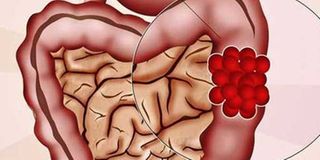Miraa, hot tea, mursik blamed for cancer cases

Oesophagus cancer is the top killer in Kenya ahead of cervix, breast, stomach and prostate cancers with 4,354 deaths every year. PHOTO | FILE | NATION MEDIA GROUP
What you need to know:
- Oesophagus cancer is the top killer in Kenya ahead of cervix, breast, stomach and prostate cancers with 4,354 deaths every year.
- When mursik is ingested several times daily, the repeated exposure to carcinogenic levels of ethanol may contribute to the initiation of cancer formation of the oesophagus.
- Early signs include difficulty in swallowing, having a feeling that something is stuck in the throat and weight loss.
- Food pipe cancer is also linked to volcanic soils, alcohol and tobacco chewing or smoking.
Taking hot tea while chewing miraa and frequent drinking of mursik (fermented milk) are the leading causes of cancer of the oesophagus or food pipe in Northern Kenya and Rift Valley respectively.
The National Cancer Institute on Thursday said Rift Valley, upper Eastern and North Eastern regions recorded the highest number of oesophageal cancers.
Oesophageal cancer is the top killer in Kenya ahead of cervix, breast, stomach and prostate cancers with 4,354 deaths every year.
“Potential risk factor associated with oesophageal cancer in a study conducted in Tenwek shows that hot beverage, and use of mursik were independently associated with oesophageal cancer,” said Mr Alfred Karagu, acting chief executive of the National Cancer Institute.
He said when mursik is ingested several times daily, the repeated exposure to carcinogenic levels of ethanol may contribute to the initiation of cancer formation of the oesophagus.
'CAUSES IRRITATION'
Even though Nairobi and other regions consume hot tea, Mr Karagu said the chewing of miraa and tobacco coupled with the consumption of hot tea among the northern Kenya residents causes irritation of the inner lining of the food pipe
Mr Karagu added that the reason most patients with this type of cancer do not survive is because of the damage to the food pipe by the disease, especially if it is not detected early.
“Most patients come in late and we are not able to do much and because the cancer obstructs the food pipe. Feeding for the patients becomes a problem and they succumb,” he said.
Early signs include difficulty in swallowing, having a feeling that something is stuck in the throat and weight loss.
Surgery, which is the preferred treatment for patients of cancer of the oesophagus, requires the removal of some or most of the oesophagus.
The operation is expensive and patients hardly have the funds for it, said Mr Karagu.
Mr Karagu said late diagnosis of new cancers and failure to promptly spot recurrences among those who have survived the disease contribute to premature deaths.
Food pipe cancer is also linked to volcanic soils, alcohol and tobacco chewing or smoking.
In its Globocan report that analyses new cases and deaths among men and women, the World Health Organisation's International Agency for Research on Cancer (IARC) said oesophageal cancer kills 4,354 Kenyans every year, overtaking cervix, breast, stomach and prostate cancers.




